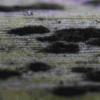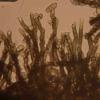
26-01-2026 11:49
Margot en Geert VullingsWe found this possible anamorph on a dead Cytisus

25-01-2026 23:23
Hello! I found this species that resembles Delitsc

18-01-2026 12:24
Hello.An anamorph located on the surface of a thin

23-01-2026 21:50
Cameron DKI am looking for this please publication. is anyon

10-01-2026 20:00
Tom SchrierHi all,We found picnidia on Protoparmeliopsis mur

21-01-2026 16:32
Gernot FriebesHi,I need your help with some black dots on a lich

21-01-2026 16:48
Gernot FriebesHi,after my last unknown hyphomycete on this subst
Densely Grouped Conidiophores on Phragmites
Peter Thompson,
21-11-2017 11:59
I have found a hyphomycete which grows densely clustered along the small ridges of a dead leaf of Phragmites australis.
The conidiophores are mid-brownish, knobbly, with scars along them and measuring between 68 - 130 x 5 um. They are smooth, regularly septate and thick walled.
The conidia are pale 1- 3-septate, with the largest being 16 - 18.5 x 7.25 - 8 um. Their bases are flattened, where previously attached to the conidiophores.
The closest species which I can find in the literature is Dendryphiella infuscans, but this species does not seem to grow in dense tufts, like mine.
I have attached a photo of the fruit bodies and also a microphoto, showing more detail of their structure.
I wonder if anyone has any ideas as to what they might be?
Thank You,
With Best Wishes,
Peter.
Chris Yeates,
21-11-2017 17:15

Re : Densely Grouped Conidiophores on Phragmites
It looks very like a species of Cladosporium, a very common and rather complex genus. See:
https://www.researchgate.net/publication/284233129_Common_but_different_The_expanding_realm_of_Cladosporium
https://www.researchgate.net/publication/284233129_Common_but_different_The_expanding_realm_of_Cladosporium
Peter Thompson,
21-11-2017 17:46
Re : Densely Grouped Conidiophores on Phragmites
Hello Chris,
Thanks. I will have a look through this paper.
I did consider the genus Cladosporium, but was not sure that they would grow so densely grouped as my sample.
With Best Wishes,
Peter.
Thanks. I will have a look through this paper.
I did consider the genus Cladosporium, but was not sure that they would grow so densely grouped as my sample.
With Best Wishes,
Peter.
Herrera Emerson,
21-11-2017 18:01
Re : Densely Grouped Conidiophores on Phragmites
Buen día, por el momento pense en Cladosporium pero esta produce esporas de una celula. Son irregulares pero no es Cladosporium.
Chris Yeates,
21-11-2017 18:16

Re : Densely Grouped Conidiophores on Phragmites
Does "esta produce esporas de una celula" mean "produces spores with a single cell"? Because Cladosporium conidia can have several septa - compare with:
http://www.discoverlife.org/20/q?search=Cladosporium+macrocarpum
Chris
http://www.discoverlife.org/20/q?search=Cladosporium+macrocarpum
Chris

